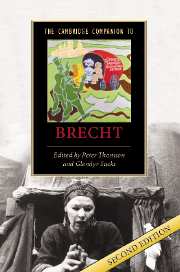Book contents
- Frontmatter
- Part I Context and Life
- Part II The Plays
- 4 Brecht’s early plays
- 5 The Threepenny Opera
- 6 Brecht’s clowns: Man is Man and after
- 7 Learning for a new society: the Lehrstück
- 8 The Good Person of Szechwan
- 9 Mother Courage and Her Children
- 10 Life of Galileo: between contemplation and the command to participate
- 11 The Caucasian Chalk Circle: the view from Europe
- Part III Theories and Practices
- Bibliography
- Index
- Series List
10 - Life of Galileo: between contemplation and the command to participate
from Part II - The Plays
Published online by Cambridge University Press: 28 March 2007
- Frontmatter
- Part I Context and Life
- Part II The Plays
- 4 Brecht’s early plays
- 5 The Threepenny Opera
- 6 Brecht’s clowns: Man is Man and after
- 7 Learning for a new society: the Lehrstück
- 8 The Good Person of Szechwan
- 9 Mother Courage and Her Children
- 10 Life of Galileo: between contemplation and the command to participate
- 11 The Caucasian Chalk Circle: the view from Europe
- Part III Theories and Practices
- Bibliography
- Index
- Series List
Summary
'The “dialectics” of Brecht's later work sometimes lie close to paradox.'
An apocryphal story relates that, after abjuring his discoveries about the Earth's orbit, Galileo stumbled to his feet, muttering drily, 'And yet it moves.' Brecht's original title for his Life of Galileo, The Earth Moves, evokes this post-inquisition defiance. The title also signals a political conviction, grounding the play's politics in the belief that everything changes, from the social order to the meaning of a dropped pebble or a glass of milk. Courageously optimistic, Galileo posits that despite all, everything will eventually change for the better: 'Now the word is, “that's how things are, but they won't stay like that”.'
It is fitting, then, that this play should itself have been subject to so many changes, so many shifts in its structure and emphasis, as it made its way from Scandinavia to Zürich to California to New York to Cologne and, at last, to East Berlin.
Brecht worked on his Life of Galileo from the late 1930s to his death in 1956. The development of the play is complex, but can be broadly described as falling into three stages of work resulting in three versions. The first was created in Danish exile, just prior to the Second World War, performed in Zürich in 1943 but written in 1938 with an eye to the American market.
- Type
- Chapter
- Information
- The Cambridge Companion to Brecht , pp. 143 - 159Publisher: Cambridge University PressPrint publication year: 2006
- 1
- Cited by



